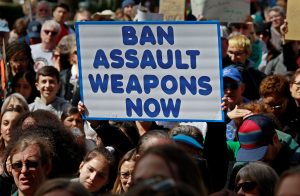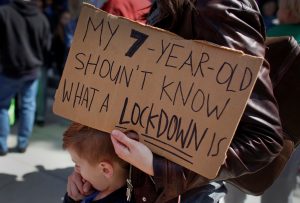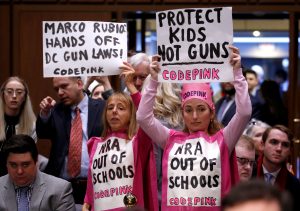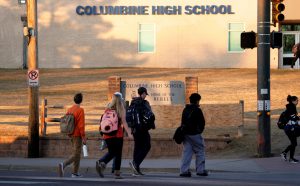
By Peter Szekely
NEW YORK (Reuters) – The youth-led U.S. gun control movement that flexed its public muscle with huge weekend rallies has already nudged Congress to enact minor firearms changes, but must remain active if it hopes to win more meaningful regulations, lawmakers said on Sunday.
The movement that erupted after the Feb. 14 mass shooting at Marjory Stoneman Douglas High School in Parkland, Florida, has generated a national conversation about gun rights and has chipped away at legislative gridlock on the issue, they said.

A protestor holds a sign during a “March For Our Lives” demonstration demanding gun control in Sacramento, California, U.S. March 24, 2018. REUTERS/Bob Strong
“The activism of these young people is actually changing the equation,” Senator Tim Kaine, a Virginia Democrat, said a day after hundreds of thousands of protesters rallied in Washington.
Tucked into a $1.3 trillion spending bill Congress passed last week were modest improvements to background checks for gun sales and an end to a ban on the U.S. Centers for Disease Control and Prevention studying the causes of gun violence.
“These are two things we could not have done in the past,” Kaine said on CNN’s “State of the Union” program. “But the active engagement by young people convinced Congress we better do something.”
The spending bill, which President Donald Trump signed on Friday, also includes grants to help schools prevent gun violence.
The Trump administration also took a step on Friday to ban the sale of bump stocks – devices that enable semi-automatic weapons to fire like machine guns – that helped gunman Stephen Paddock massacre 58 people in Las Vegas in October.
A key focus of Saturday’s march on Washington, which was duplicated in 800 cities across the country and around the world, was an effort to turn emotion into political activism by registering participants to vote.
Americans will vote in November on the entire U.S. House of Representatives and one-third of the Senate.
Gun control advocates have called for universal background checks on people buying guns, bans on assault-style rifles such as the one used to kill 17 students and staff in Parkland, and large-capacity ammunition magazines.
Senator Mark Warner, another Virginia Democrat, declared in the wake of the student-led movement that he would now support bans on such rifles and magazines, which he had voted against in recent years.
“I think it’s time to change our positions and re-examine them,” Warner said on the CBS News “Face the Nation” program.
“I think this time it’s going different,” Warner said. “I think we can actually get it done.”
To win significant changes, lawmakers said the young gun control advocates need to maintain their drive in the face of powerful pro-gun lobbying by the National Rifle Association and those who see gun ownership as a right protected by the U.S. Constitution.

A protestor holds a sign during a “March For Our Lives” demonstration demanding gun control in Sacramento, California, U.S. March 24, 2018. REUTERS/Bob Strong
“If they don’t keep it up, those that want no change will just sit on their hands,” Ohio Governor John Kasich, a Republican who formerly served in Congress, said on CNN.
Two Republican senators, Marco Rubio of Florida and Joni Ernst of Iowa, said over the weekend that while they supported gun control advocates’ right to protest, they opposed infringing on the constitutional right to bear arms.
Meanwhile, former Pennsylvania Republican Senator Rick Santorum drew an angry response on social media for saying on CNN that, instead of agitating for change, students should “do something about maybe taking CPR classes” or take other training to respond to school shooters.
(Reporting by Peter Szekely; Editing by Paul Simao)










